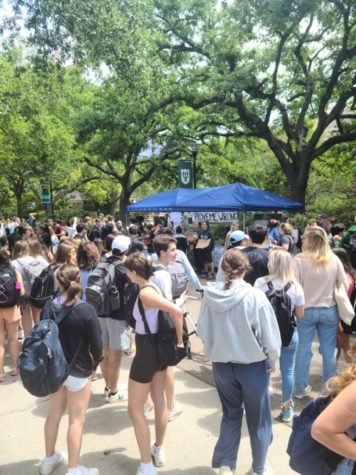Survey shows free speech values drop at colleges
November 18, 2022

A recent national survey showed that very low levels of college students value free speech, raising a new question: given Tulane University’s commitment to an inclusive community, how well does the national survey accurately reflect campus culture at Tulane?
This October, Yale University’s William F. Buckley, Jr. Program conducted their eighth annual survey of 803 full-time undergraduate students attending private and public four-year colleges and universities across the United States. The main categories included in the survey were free speech, American values, diversity, equity, inclusion and gender identity.
Eighty percent of students said they believe the First Amendment is important, but 11% agreed it was an “outdated” amendment in today’s society. Although still by far a majority, the survey indicates that students have lost respect for the Constitution’s protection of free speech.
Meanwhile, on speech regulation, national student responses were relatively close.
Forty-three percent said political opinions they personally found offensive should be reported to school administrators. Fifty-one percent said administrators or professors should prohibit certain issues from being debated on campus.
Those responses could be seen as a dramatic shift from the traditional welcoming of diverse political ideas in a college setting.
“It’s more important that a college campus is a place that [students] feel safe,” freshman Tatiana Robb said. “There’s a difference between recognizing that hate speech exists and there’s reasons that these groups are spewing it, and giving space to them.”
Additionally, 63% of students surveyed reported feeling intimidated in sharing an opinion that differed from their peers, and 58% reported being intimidated to share an opinion different from their professors — both increases from last year’s findings. Politics and identity topics like race, religion, gender and sexual preferences were all high on the list of topics students felt uncomfortable discussing.
“When you go into a room and you share your identity, it’s like you’re exposing part of yourself,” junior and international student Aim Niamnud said. “People would just look at me and be like, ‘Oh, you’re the only international student in the room.’ And I’m just there like, ‘Yeah, I’m international, nice to meet all of you.’”
Niamnud said identity is a big part of how people conceive themselves and usually comes from a place of pride.
“Coming into a room where you don’t know what other people’s identities are and how they really view you, is also an intimidating factor,” Niamnud said.
In today’s increasingly polarized political climate, avoidance of political discussions may not seem surprising.
“I do know a lot of people who feel uncomfortable talking about politics or about their beliefs with their professors or with peers because they just don’t know where people stand,” Robb said.
Niamnud, who is also co-president of the Asian American Student Union at Tulane, said “That’s the purpose of multicultural orgs. on campus, to provide a space for people to talk to each other, share ideas … making sure it’s safe, making sure it’s comfortable, making sure that everybody who’s in the space knows that they just have to borderline be respectful.”
Yet in the national survey, only 19% of students still reported that they felt nothing was off limits for discussion.
Free speech has historically been a tool protected for all Americans that can lead to further education and cultural awareness.
After all, Robb said, “part of the beauty of Tulane is that everyone comes in with different perspectives and different walks of life.”






















Leave a Comment